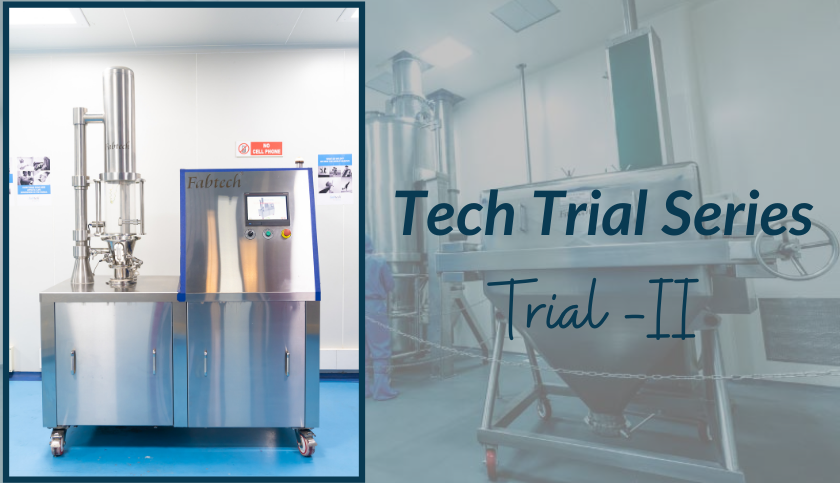The trial at Application Service Centre Part-2

This blog is a continuation of the Tech trial series Part-I where we talked about the development of NPS sugar beads from sugar powder using Fluid Bed Columns for one of our customers. In this series, we take our trial one step ahead for developing the sugar beads by using a dry powder layering technique in Roto Bed inset to Roto Granulator.
Development of NPS sugar beads from sugar powder using Dry Powder Layering Technique in Roto Bed insert to Roto Granulator FRG series LM.
Non-Pareil Sugar seeds (NPS) of varying sizes have always been conventionally prepared in coating pans for the last four or more decades. This requires skilled human resources and consumes lots of man-hours, and the product needs to be finally dried in Tray Driers overnight to get the right and desired dryness and hardness to the seeds. More often than not, the first throughput yields are also not very high. The process itself is done on a conventional coating pan and is very difficult to validate, and presents a very dusty environment in the process zone.
We have already seen earlier how the process could be automated in FB columns using Wurster bottom spray. But it was a time-consuming process, though unhindered but still taking a lot of time. We also saw how the same process could be much shortened in a Roto Granulator with the tangential gun insert using a Suspension Layering technique. The Roto bed principle of Centrifugal action helped reduce the time by almost two thirds, meaning a process of 9 hours could now be done and dusted in just about 3 hours!
The current trial was intended to see how the same process employed in the conventional coating pan dry powder dusting technique worked in centrifugal fluid bed equipment like the FRG. Here are the trial results:
Materials & Methods employed:
Substrate: Sugar refined 80 mesh powder
Coating dispersion: Sugar crystals (30 mesh) in Water to make 50% sugar syrup
Dry Powder for dusting: Mixture of Sugar (80 mesh) and Corn Starch (100 mesh)
Equipment Used: Fablife Particle Coater Granulator FPCG Lab Model LM 1
Spray Nozzle: Coaxial type with 0.8 mm nozzle orifice
Peristaltic Pump: Watson Marlow
Solution Tubing: Silicon Tubing 6mm OD / 4 mm ID 1 mm WT
Process parameters
| Substrate Load | 0.500 kg |
| Sugar Syrup Solution | 0.250 kg |
| Dry Powder Qty | 1.000 kg |
| Exhaust Air Blower Speed | 2400 RPM |
| In Let Air Temp | 50 deg C |
| Product Bed Temp | 32 to 35 deg C |
| Exhaust Temp | 28 to 32 deg C |
| Atom Air press | 1.2 bar |
| Pump Speed | 5 rpm |
| Spray Rate | 4.20 gms per min |
| Powder Feed | 15.0 gms per min |
| Dusted Qty | 1.000 kgs |
| Substrate Load | 0.500 kgs |
| Final Drying time | 10 mins @ 40 deg C |
| Total process time | 1 hour and 10 mins |
| Yield Issues | about 92 % (8% agglomerates and losses) |
Final Pellet size range 40 to 50 mesh Hard almost spherical
Note: If continued for more time, then sphericity and size will improve
Final Observations:
It was observed that it is possible to obtain spheres from the Dry Powder Dusting technique when using Centrifugal equipment such as the FRG to obtain spherical pellets of sugar NPS. The dry powder method is very fast, as one can surmise easily from the above process details. Furthermore, the spherical nature is also very satisfactory. Therefore, this process can be adapted for various API loading onto NPS, especially when high amounts of drug loading are desired.
Examples are drugs like Ibuprofen, Flurbiprofen, Theophylline, Doxycycline and others, where a 100 mg or more dose is required per unit. Ideally, dry powder layering using Centrifugal equipment over nuclei of either the drug crystals themselves or any neutral seed substance would be worthwhile candidates for this process adoption. The key parameters to success can be listed as follow:
- The ratio between the particle sizes of the seed material Vs that of the dry powder particle is critical. Generally, the more skewed the ratio, is better is the layering process.
- Disc Speed is critical to prevent agglomeration and large scale “balling”
- Gap between the disc and the wall
- Spray Rate Vs Powder dusting Rate (very critical)
- Atomization Pressure of liquid sprayed
- Particle size range of Dusting Powder Mix
- Air Balance between inlet and exhaust blowers
- The twisted rope appearance of the bed and the floating (air suspended feel of the bed)
This equipment is found to be very good for the studied purpose in particular reference to the quality of the sphericity and the size range, observed, the shorter process timings.
In our continuing series, we will see this as well as several other trials conducted on various pharmaceuticals, foods and nutraceuticals at the Application Services Center in recent times.
Categories
Recent Posts
Subscribe
Never miss a post from Fabtech. Sign up to receive updates direct to your inbox.
